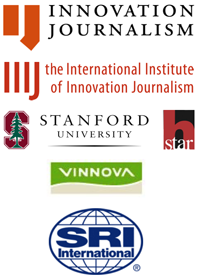Innovation, anyone? R&D? University funding?
As sure as the presidential election won't be about foxhunting, it won't be about science and technology.
"We've sort of resigned to the fact that America is a funny country," says Woody Powell, professor at Stanford University and editor of the journal "Research Policy."
It sure is funny - or at least weird - that an industry spending way over $300 billion a year gets less attention than if a superdelegate decides to use the bathroom in the Clinton mansion.
But contrary to popular belief, it's not all the media's fault.
"The scientific community has very few spokespersons on the national level," Powell goes on. "Perhaps it's because we're reluctant to talk out loud about how dependent we are on foreigners at the moment. A lot of people wouldn't like that."
Another reason is that most universities hesitate when it comes to openly embracing the gritty rules of politics.
"We are supposed to be Eiffel towers," Powell says. "Eiffel towers don't get down in the mud."
So what about the candidates? Don't they have any interest in raising the issue?
"The candidates can't start talking about things where there is basically no difference between themselves and their opponent," says Kei Koizumi, director of the R&D Budget and Policy Program at the American Association for the Advancement of Science.
So is there any difference in the three candidates over science and technology policies? Well, at least none that are remotely big enough to compete with more pressing issues.
"Most voters are understandably focused on the economy, healthcare, and Iraq," says Tom Kalil, who is an adviser to Hillary Clinton on innovation policy.
The candidates do have some differences on science and technogy policy.
"There is a foundation that is common," Mr. Koizumi says. "What unites them is first and foremost the strong support for federal funding and embryonic research."
Things that separate them are obviously harder to find. McCain really likes tax breaks and thinks they are also a mean to foster innovation.
More important, though, he supports expansion of the H1-B visas - in opposition to some of his party colleagues
"But mere expansion is not enough. Reforms should eliminate the artificial limits and allow the Department of Labor to set a level of visas appropriate for market conditions," Senator McCain said earlier this year.
Barack Obama also shows strong support for H1-B visas. He supports "net neutrality" and wants to establish a national Renewable Energy Portfolio Standard that in 2025 would require renewable energy sources to represent 25 percent of the US electricity consumption.
"Clinton has the most elaborate plan of the candidates," says Patrick Windham, a lecturer at Stanford University and a former adviser to Al Gore.
She wants to establish a $50 billion Strategic Energy Fund to promote renewables. More significantly, she wants to increase the NIH budget by 50 percent over 5 years and double it over 10 years.
"That would have a lot of impact," says Mr Koizumi. "But I have no idea where she will find the money."
AAAS compares the candidates
TechChrunch endorses McCain and Obama
Friday, March 14, 2008
It's not about the science, stupid
HP opens up the Lab doors
With it’s new Idea Lab, Hewlett-Packard gives outsiders a peek into their corporate research. The aim is to attract input from users, in the hope that it will speed up the companys’s innovation process.
Imagine opening your closet and immediately finding yourself face-to-face with a fire-breathing dragon, fresh from the gates of Hell. Or that you can look right through the wall of a building and see exactly where the electrical wires and water-pipe goes.
It might all be possible, using new a technology developed at HP Labs, Hewlett-Packard's corporate research organization. Called Mscapes, it imposes a virtual environment upon the real, physical one, and uses GPS-based navigation to pinpoint exactly where you are.
Mscapes is one of a number of projects that HP Labs is exhibiting in its new web site for Idea Lab, which gives visitors a hint of what the corporation’s researchers are up to. Here, you can download examples of new software, look at demos and write your comments and submit examples of your own on the site’s forums.
The Idea Lab is part of HP’s new “Open Innovation” strategy, a major component in the radical reorganization of the labs that Hewlett Packard announced last week. “We recognize that not all smart people in the world work at HP Labs,” said Prith Banerjee, head of HP Labs, during a presentation last week.
By encouraging feedback, the HP´s management hopes to encourage users and outside developers to help the company bring new innovations to market faster.
Some examples on display at the Idea Lab include new photoediting tools, mobile printing from cellphones and a service for republishing of old books on demand. The site also shows a new way of capturing and viewing small, almost undetectable details on objects.
The Idea Lab can be seen as an attempt to emulate the success of user-driven software development and user-generated content -- like Linux, MySQL, Flickr, Picasa and Facebook. If a big corporation like HP really can acheive this remains to be seen. However Mscape is already on its way to building a user community that creates its own content -- be it travels through a mysterious time-hole or a simple game where you stamp out moles (virtual ones that is).
Patrick Windham : Doubts on America's Innovation Strategy
Patrick Windham served as Senior Professional Staff Member for the Subcommittee on Science, Technology, and Space of the U.S. Senate’s Committee on Commerce, Science, and Transportation. Holding an authority on science, and technology policy issues here is what he thinks is lacking in America’s innovation strategy and health care sector in specific...

